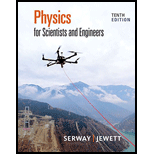
Review. A global positioning system (GPS) satellite moves in a circular orbit with period 11 h 58 min. (a) Determine the radius of its orbit. (b) Determine its speed. (c) The nonmilitary GPS signal is broadcast at a frequency of 1 575.42 MHz in the reference frame of the satellite. When it is received on the Earth’s surface by a GPS receiver (Fig. P38.41), what is the fractional change in this frequency due to time dilation as described by
where Ug is the change in gravitational potential energy of an object–Earth system when the object of mass m is moved between the two points where the signal is observed. Calculate this fractional change in frequency due to the change in position of the satellite from the Earth’s surface to its orbital position. (e) What is the overall fractional change in frequency due to both time dilation and gravitational blueshift?
Figure P38.41

(a)
Answer to Problem 41P
Explanation of Solution
Given info: The time period of the satellite moving around earth in the circular orbit is
The value of force of gravitational constant
The mass of earth is
Explanation:
From Newton’s second law, the nature of the force between the earth and satellite system is the gravitational force between the earth and the satellite and the centripetal force between them. Both the forces should be equal so that the satellite can revolve in an orbit.
The formula to calculate gravitational force is
Here,
The speed of the satellite is
Here,
The time period of the satellite is,
The formula to calculate the centripetal force is
Here,
Substitute
Equate equation (1) and (2)
Substitute
Thus the radius of the orbit of the satellite is
Conclusion:
Therefore, the radius of the orbit of the GPS satellite in which ir revolves around the earth is
(b)
Answer to Problem 41P
Explanation of Solution
Explanation
The formula to calculate the speed of the satellite revolving around the earth in a circular orbit is,
Substitute
Thus the speed of the satellite is
Conclusion:
Therefore, speed of the satellite revolving around the earth in a circular orbit is
(c)
Answer to Problem 41P
Explanation of Solution
Explanation
Given info: The broadcast signal frequency of the GPS satellite is
The formula to calculate the frequency of any signal is,
Here,
Differentiate the above equation.
Thus, the fractional change in the frequency is the equal to fractional change in the time period.
The formula to calculate the fractional increase in time period is,
Here,
The formula to calculate the relativistic factor is,
Here,
Substitute
Substitute
Take the Binomial expansion series expansion of the term
Substitute
Thus the fractional change in frequency is
Conclusion:
Therefore, fractional change in the received frequency is
(d)
Answer to Problem 41P
Explanation of Solution
Explanation
The formula to calculate the gravitational blue shift is,
Here,
The formula to calculate the gravitational potential energy between the earth’s surface and the satellite orbit is
Here,
Substitute
Substitute
Substitute
Thus the fractional change in frequency due to the gravitational blue shift is
Conclusion:
Therefore, fractional change in frequency due to the gravitational blue shift is
(e)
Answer to Problem 41P
Explanation of Solution
Explanation
The overall fractional change in the frequency is the sum of the both the fractional changes.
Thus the overall fractional change is the sum of the fractional change in the frequency due to the time dilation and fractional change in the frequency due to the gravitational blue shift.
The formula to calculate the overall fractional change is,
 Overall fractional change =
Overall fractional change =
Substitute
Conclusion:
Therefore, the overall fractional change in the frequency is
Want to see more full solutions like this?
Chapter 38 Solutions
Physics for Scientists and Engineers
- A thrown brick hits a window, but doesn't break it. Instead it reverses direction and ends down on the ground below the window. Since the brick didn't break the glass, we know: О The force of the brick on the glass > the force of the glass on the brick. О The force of the brick on the glass the force of the glass on the brick. = О The force of the brick on the glass < the force of the glass on the brick. О The brick didn't slow down as it broke the glass.arrow_forwardAlexandra (wearing rubber boots for traction) is attempting to drag her 32.6-kg Golden Retriever across the smooth ice by applying a horizontal force. What force must she apply to move the dog with a constant speed of 0.950 m/s? ☐ 31.0 lb. ☐ 319 kg. ○ Zero. 32.6 kg.arrow_forwardThe figure shows a graph of the acceleration of an object as a function of the net force acting on it. The mass of this object, in grams, is closest to 11 a(m/s²) 8.0+ 6.0- 4.0- 2.0- 0+ F(N) 0.00 0.50 1.00 ☐ 130 ○ 8000 ☐ 89arrow_forward
- Values that are within standard deviations represent measurements that are considered to be near the true value. Review the data from the lab and determine whether your data is within standard deviations. Report, using numerical values, whether your data for each angle is within standard deviations. An acceptable margin of error typically falls between 4% and 8% at the 95% confidence level. Review your data for each angle to determine whether the margin of error is within an acceptable range. Report with numerical values, whether your data for each angle is within an acceptable margin of error. Can you help explain what my data means in terms of the standard deviation and the ME? Thanks!arrow_forwardA sinusoidal wave is propagating along a stretched string that lies along the x-axis. The displacement of the string as a function of time is graphed in (Figure 1) for particles at x = 0 and at x = 0.0900 m. You are told that the two points x = 0 and x = 0.0900 m are within one wavelength of each other. If the wave is moving in the +x-direction, determine the wavelength. If instead the wave is moving in the -x-direction, determine the wavelength. Please show all stepsarrow_forwardYou are designing a two-string instrument with metal strings 35.0 cm long, as shown in (Figure 1). Both strings are under the same tension. String S1 has a mass of 8.30 g and produces the note middle C (frequency 262 Hz ) in its fundamental mode. What should be the tension in the string? What should be the mass of string S2 so that it will produce A-sharp (frequency 466 Hz ) as its fundamental? To extend the range of your instrument, you include a fret located just under the strings but not normally touching them. How far from the upper end should you put this fret so that when you press S1 tightly against it, this string will produce C-sharp (frequency 277 Hz ) in its fundamental? That is, what is x in the figure? If you press S2 against the fret, what frequency of sound will it produce in its fundamental?arrow_forward
- Please solve and answer the problem correctly please. Thank you!!arrow_forwardPlease help explain this. The experiment without the sandpaper had a 5% experimental error, with sandpaper it is 9.4%. Would the explaination be similar to the experiment without sandpaper? Thanks!arrow_forwardA sinusoidal wave with wavelength 0.400 m travels along a string. The maximum transverse speed of a point on the string is 3.00 m/s and the maximum transverse acceleration is 8.10×104m/s2. What is the propagation speed v of the wave? What is the amplitude A of the wave?arrow_forward
 Physics for Scientists and Engineers with Modern ...PhysicsISBN:9781337553292Author:Raymond A. Serway, John W. JewettPublisher:Cengage Learning
Physics for Scientists and Engineers with Modern ...PhysicsISBN:9781337553292Author:Raymond A. Serway, John W. JewettPublisher:Cengage Learning Physics for Scientists and EngineersPhysicsISBN:9781337553278Author:Raymond A. Serway, John W. JewettPublisher:Cengage Learning
Physics for Scientists and EngineersPhysicsISBN:9781337553278Author:Raymond A. Serway, John W. JewettPublisher:Cengage Learning Principles of Physics: A Calculus-Based TextPhysicsISBN:9781133104261Author:Raymond A. Serway, John W. JewettPublisher:Cengage Learning
Principles of Physics: A Calculus-Based TextPhysicsISBN:9781133104261Author:Raymond A. Serway, John W. JewettPublisher:Cengage Learning Physics for Scientists and Engineers: Foundations...PhysicsISBN:9781133939146Author:Katz, Debora M.Publisher:Cengage Learning
Physics for Scientists and Engineers: Foundations...PhysicsISBN:9781133939146Author:Katz, Debora M.Publisher:Cengage Learning Modern PhysicsPhysicsISBN:9781111794378Author:Raymond A. Serway, Clement J. Moses, Curt A. MoyerPublisher:Cengage Learning
Modern PhysicsPhysicsISBN:9781111794378Author:Raymond A. Serway, Clement J. Moses, Curt A. MoyerPublisher:Cengage Learning Physics for Scientists and Engineers, Technology ...PhysicsISBN:9781305116399Author:Raymond A. Serway, John W. JewettPublisher:Cengage Learning
Physics for Scientists and Engineers, Technology ...PhysicsISBN:9781305116399Author:Raymond A. Serway, John W. JewettPublisher:Cengage Learning





